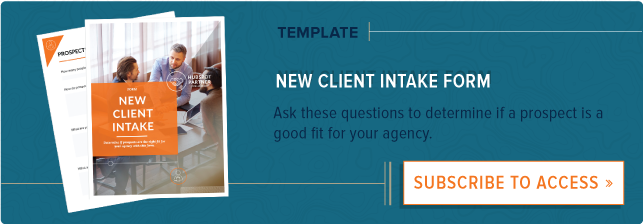
New business is simultaneously exciting and stressful for agencies.
While your team is focused on the thrill of a profitable win, they’re also stressed about meeting deadlines, impressing the prospect, and maintaining current client relationships. It can all be a lot to handle — and there’s no room for legal mistakes.
You didn’t go into marketing to deal with legal issues. But while you’re navigating agency new business at warp speed, it’s easy to make an oversight or misstep that could cause negative legal consequences or financial loss for the agency. 
To reduce your risk of running into legal trouble, it’s important to be aware of the most common legal mistakes agencies make during their new business efforts, and how to fix (or avoid) them.
5 Common Legal Mistakes Agencies Make
1) You don’t protect your agency’s intellectual property during a pitch or discovery session, or in your proposal.
How to fix it: Sometimes it’s a valid business decision to allow the client to own IP in pitch materials, spec creative or proposals — either because the agency negotiated payment for it, or because it’s a required “ticket” to participate in the opportunity. But make it an intentional decision.
Unless you’ve agreed with a prospective client that it will own the agency’s pre-engagement IP, consider a Nondisclosure Agreement that protects the agency’s ownership position. Absent that, at a minimum include IP ownership clauses in your proposal and pitch assets, and use copyright ownership notices on these materials and any spec creative produced.
2) You accept the client’s services contract without a legal review, or without pushing back on terms that are unattractive for the agency.
How to fix it: A proposed contract form is a suggestion, not a requirement. First, make sure you fully review the client’s contract (and related documents, like a Nondisclosure Agreement) and, if needed, have it vetted by legal counsel.
Second, be aware of the legally “unattractive” provisions that are most likely to be in the client’s form and — of course — drafted in favor of the client, such as: immediate IP ownership, restrictive covenants on the agency, extended work acceptance processes, or unreasonable invoicing timelines.
You can — and should — push back on the provisions that are unfair or don’t work for your Agency; You’ll never have better leverage than at the beginning of the engagement. You can also learn a lot about the client by the way they respond to your concerns.
3) Your agency recreates the legal paper trail every time it engages a new client.
How to fix it: The main reason many agencies create a “fire drill-style” experience every time they sign a new client and need to legally document the relationship is a lack of process — either having no consistent forms or language to use, or the absence of a lead person or department to handle the contract issues.
Avoid having inconsistent client service contracts, legal terms and conditions, nondisclosure agreements, IP ownership legends, and the like, by having a standard set of agency-approved contract documents and, where possible, a central person, department or procedure dedicated to the process. Then use those documents, and follow that process consistently.
4) Your agency transfers its intellectual property rights in the work to the client too soon, or gives away too much of its intellectual property to the client.
How to fix it: In many situations, everyone agrees that the client will own intellectual property in the agency’s work at some point — the question is when.
The common point of difference is that the client will want to own it immediately upon creation, while it’s in the agency’s best interest not to transfer those rights until it has been paid
Additionally, the agency may have pre-existing assets (creative, technology, process) that end up incorporated into the client’s work, but to which the Agency intends to retain ownership and only license to the client. The place to resolve these issues is in the Client’s Agency Services Contract or Legal Terms and Conditions (see Mistake #3).
5) You’re insufficiently protected from contingencies like late payments, non-payment, or legal liability for claims such as false advertising, IP infringement, or ad regulation compliance.
How to fix it: If the Agency is operating without Errors & Omissions insurance coverage, reconsider. The enhanced liability protection is easy to underrate until you have an issue or claim.
Additionally, give careful thought to the liability and indemnification language in your contracts to make sure that the agency’s liability is limited to the things actually within its control (for example, not for a product feature or claim provided by the Client).
Finally, review the payment terms in your contracts, making sure they properly incentivize the client to pay in a reasonable amount of time. Remedies like late fees, interest, and attorney fee or collection cost recovery will not be available to you unless they are in a written agreement signed by both parties.
New business is challenging enough for agencies without having to worry about the potential legal pitfalls that it creates. Sharon Toerek will be speaking on this topic at INBOUND 2016. Learn more about INBOUND.
![]()







